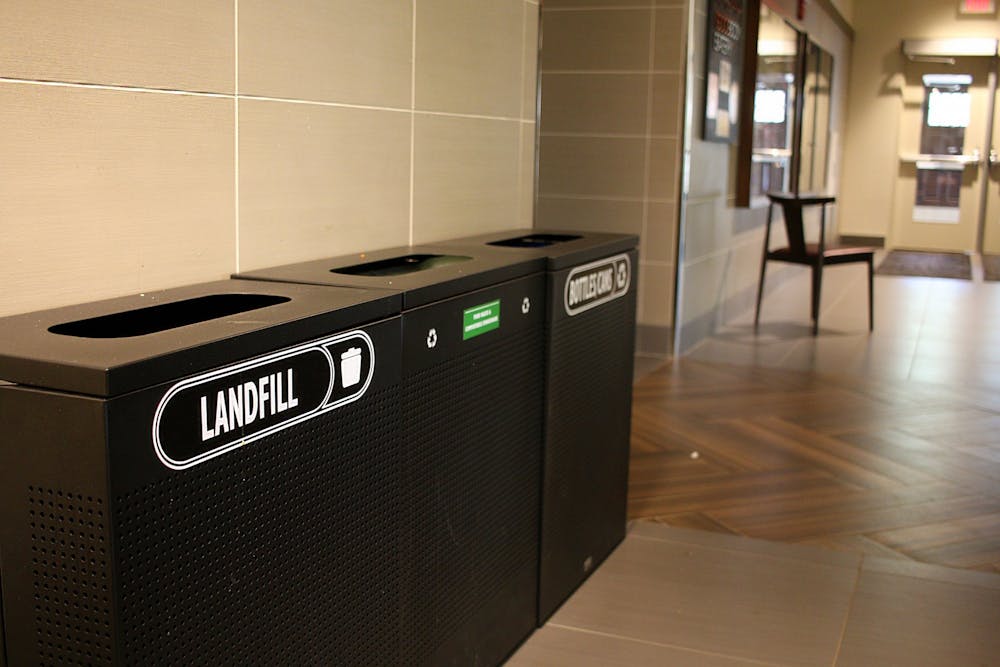IU-Bloomington's campus has stopped composting since the pandemic started in April 2020, after Green Earth Composting, a large local compost processing company, shut down. Despite signage that indicates IU still composts, Sustain IU says there are no definitive plans to continue composting currently.
When Green Earth owner Kevin Huntley died last January, the company permanently closed its doors, leaving IU limited options for rebooting composting, according to Sustain IU intern and EarthKeepers washer McKenna Conway. Green Earth provided both transportation and processing for compost, but EarthKeepers, which runs modes of transportation with FableFarms Indiana, is worried about the contamination that IU trash withholds and is unsure if such contamination can be compatible with its current facility.
IU’s current challenges for returning to composting include assessing how much organic matter the campus produces and whether EarthKeepers will take compost as contaminated as IU’s, as such a dilemma has plagued the first iteration of the composting program. Sustain IU agrees no matter what option IU chooses to resume composting, it will require immense funding and time.
Anisa Valenzuela, the sustainability specialist for Sustain IU, said when IU tries to transition back to composting, the campus will start with back of house composting. This means IU will start small; composting foods in kitchens and food preparation areas. Size and contamination are issues both Sustain IU and EarthKeepers have acknowledged as an immense problem for composting in the past.
Related: [Rises in “all-you-care-to-eat" food waste puts strains on IU Dining workers]
“Whatever we do, it will be gradual,” Valenzuela said.
McKenna agrees a route to return to composting will pose several obstacles but acknowledges that Sustain IU is actively working towards solutions.
“It’s really just a matter of logistics and funding, like figuring out what is the best financial option for IU,” McKenna said. “IU just doesn’t have the means right now to send the food anywhere but landfill. But we’re working on that and that is a huge goal of Sustain IU to get that up and running again.”
EarthKeepers CEO Andrea Conway and COO Ryan Conway agree this will be a long, carefully executed process.
“We believe in program structures that actively anticipate user needs and behaviors, which take time to properly build, test, retest, and calibrate,” Andrea and Ryan said in an email. “We understand is that this reboot of IU composting will start low and slow, proceeding at a pace of sustainable success for all parties involved.”
Both said they have acknowledged that IU has attempted to compost in the past, but between the overload and contamination of trash, as well as lack of educational marketing, it is simply too unstable for EarthKeepers to operate.
Related: [OPINION: This Thanksgiving, consider composting scraps to help the environment]
“A critical yet common error in pushing for large-scale composting programs is neglecting extensive front-loading of education, incentive, and enforcement around contamination,” they said in an email. “Contamination destroys compost programs and recycling programs.”
But despite IU’s lack of composting, the Indiana Memorial Union still has “Compost” signs under trash cans in the building. Sustain IU said it would simply be too inconvenient to keep the signs plastered, especially with staffing shortages in IU Residential Programs and Services.
Valenzuela claims that if the signs are removed, the paint on the wall will simultaneously be removed, thus discouraging staff to remove such signs.
While Venezuela is unsure if composting will be back at IU by the end of the academic year, she said she is optimistic it will make a return in the near future.
“I like the analogy that says: a big institution like this is like a huge oil tanker; in the near term, it may move just a few centimeters, but in the long run, it really changes the course,” Valenzuela said. “Slowly and surely, we’ll get there.”
CORRECTION: A previous version of this article misstated how Earthkeepers operates and works with IU.






